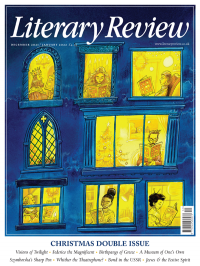Stephen Romer
I Shall Wear Austin Reed
The Letters of T S Eliot, Volume 9: 1939–1941
By Valerie Eliot & John Haffenden (edd)
Faber & Faber 1,059pp £60
T S Eliot’s sojourn in purgatory shows little sign of coming to an end. He has been at the sharp edge of feminist critique for a while, most recently in a series of essays examining The Waste Land from the perspective of the #MeToo movement. Moreover, the opening last year of the archive in Princeton University Library containing Eliot’s correspondence with his longtime confidante Emily Hale (one-sided, since Eliot burned Hale’s letters) occasioned a further display of moral censure. In an unfortunate move, Eliot, anticipating the fascination the letters would arouse, composed his own account of his relationship with Hale, to be released at the same time as the letters. Eliot’s statement (deposited at Harvard) has done nothing to lessen the animus against him; rather, its frankly clumsy and patronising disclaimers, notably that the relationship was as chaste as a vicar’s tea party (through which Eliot surely intended to protect his second wife, Valerie), have done his reputation still more damage.
There remains, however, a group of aficionados devoted to his work, among them John Haffenden, the ever-discreet and consistently diligent editor of a monument in progress, The Letters of T S Eliot. This ninth volume in the project covers the years 1939 to 1941. It opens just after Eliot

Sign Up to our newsletter
Receive free articles, highlights from the archive, news, details of prizes, and much more.@Lit_Review
Follow Literary Review on Twitter
Twitter Feed
Russia’s recent efforts to destabilise the Baltic states have increased enthusiasm for the EU in these places. With Euroscepticism growing in countries like France and Germany, @owenmatth wonders whether Europe’s salvation will come from its periphery.
Owen Matthews - Sea of Troubles
Owen Matthews: Sea of Troubles - Baltic: The Future of Europe by Oliver Moody
literaryreview.co.uk
Many laptop workers will find Vincenzo Latronico’s PERFECTION sends shivers of uncomfortable recognition down their spine. I wrote about why for @Lit_Review
https://literaryreview.co.uk/hashtag-living
An insightful review by @DanielB89913888 of In Covid’s Wake (Macedo & Lee, @PrincetonUPress).
Paraphrasing: left-leaning authors critique the Covid response using right-wing arguments. A fascinating read.
via @Lit_Review